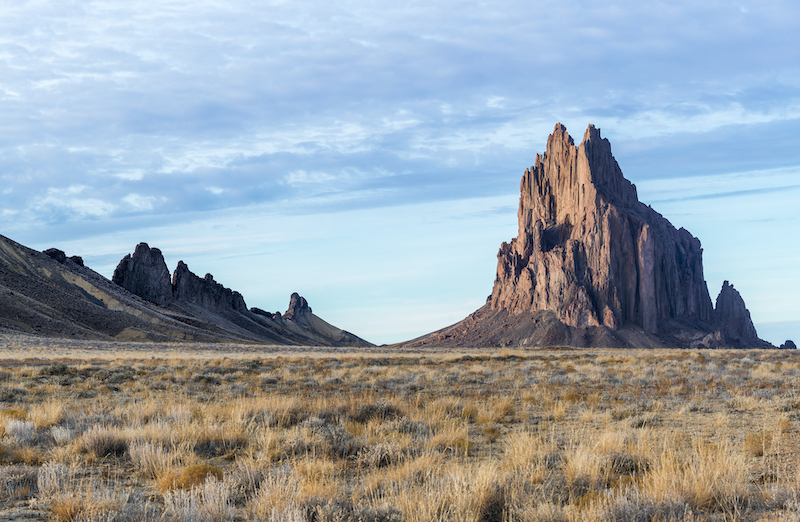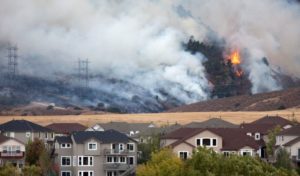
An illegal marijuana operation highlights the need for regulatory enforcement reform on tribal land.
“These lands belong to the individual farmers, they don’t belong to the chapter,” declared Dineh Benally, San Juan Farm Board President and former Navajo Nation presidential candidate. “It doesn’t belong to Window Rock.”
The vulnerability of the Navajo tribe to the spread of COVID-19 was a major story of 2020—but for the communities living in the Shiprock, New Mexico area, the other major story was the controversy and harm surrounding Benally’s illegal marijuana and hemp operation. Benally’s declaration was a salvo in his battle with the Navajo Nation government over the question of whether the tribe should or could enforce its land use regulations against an actor who openly defied them by illegally growing marijuana and hemp on reservation land.
Benally’s operation had all the markings of open-air drug production, straight out of Netflix’s Narcos. Indeed, one letter-to-the-editor in the Navajo Times called Benally “a Navajo Pablo Escobar.”
The brazenness of Benally’s operation caught the attention of national media. Rolling Stone reported that “in the fertile northeast corner of the Navajo Nation, fields that only months ago were traditional open-air corn farms are now stuffed with hundreds of industrial-size greenhouses, each glowing with artificial lights and brimming with emerald cannabis plants.” At Benally’s operation, “security cameras ring the perimeters and hired guards in flak jackets patrol the public roads alongside the farms.”
Benally has reportedly employed Chinese workers and children, as young as ten years old, to work ten-hour shifts under the sun—and he apparently did all of this with full knowledge that he was breaking the law. Reports indicate that he had previously failed to get permission for his industrial-scale marijuana operation, despite attesting that he was merely growing hemp, which has a lower concentration of THC. Benally even reportedly went so far as to issue bogus land use permits for outside entities to enter the reservation and cultivate the plants.
Residents in the area complained about illegal greenhouses, non-Native workers, and pollution from the operations. In response to the complaints, and after a long delay, officials from the Navajo Nation Environmental Protection Agency sought to inspect the operation, only to be apparently chased off by Benally.
To resolve the matter, the Navajo Nation sued Benally and his affiliates. The tribe’s initial complaint clearly charged Benally with engaging in illegal activity. But beyond that, it accused Benally also of acting contrary to “the interests of the Navajo Nation in the land.”
Fortunately, in September 2020, the Shiprock District Court granted the tribe’s motion for a temporary restraining order against Benally, noting that the “most valuable tangible asset of the Navajo Nation is its land” and that the land “belongs to the Navajo People.”
The court’s order was based on Diné Customary Law and Diné Natural Law, as well as testimony from Oliver Waley, the Executive Director of the Navajo Nation Environmental Protection Agency. Waley testified that he observed impermissible pesticide use, leaking sewage tanks, dangerous cesspools, and illegal diversion of water from the San Juan River.
The September order was not Benally’s only loss in the fall. The week before the court issued its order, arson damaged a few of Benally’s greenhouses. And in October, officers made the biggest marijuana bust in San Juan County’s history after learning that workers were processing marijuana at a budget motel in Farmington, a reservation border town.
Exhibiting indifference to the law and law enforcement, Benally and his associates reportedly continued their operations in defiance of the court’s order—until a raid by Navajo, state, and federal agents finally shut down operations in November. On the day of the raid, reflecting the mood of the community, “jubilant neighbors brought pizza to Navajo officers who assisted in the operations.”
The Benally episode is winding down but has yet to run its course fully, and the political environment in Shiprock remains heated. Incredibly, Benally has not, at least yet, faced criminal sanctions for his disregard of the law.
How could this episode have been handled better?
Some institutions performed admirably. The Navajo Times, for example, kept attention on the story and helped elevate the voices of disturbed residents. Similarly, having been asked to take a stance, the Shiprock District Court reached the right result and cleared the way for the tribe to put a halt to Benally’s operation. And the Navajo Nation police, along with non-Indian enforcement agencies, eventually shut down an ambitious drug production racket that enjoyed a thin veneer of deniability.
But after the Navajo Nation Police became aware of the problem, why did it take the Navajo Nation five months to shut down the illegal operation? There are a number of overlapping and potentially conflicting explanations for why the Benally affair dragged on as long as it did.
Perhaps Benally’s asserted position that farmers control their own land is not as far-fetched and self-serving as it may appear. After all, if the local police in Albuquerque learned of an illegal grow house, those property owners would likely be on the receiving end of a police battering ram much faster. That the Navajo Nation had to go to court and wait months for the wheels of justice to turn before raiding Benally’s operation suggests Navajo farmers do have a fair degree of independence from the dictates of the Navajo Nation central government.
Alternatively, this episode highlights the need to clarify the relationship between the Navajo Nation’s central government and its local chapters. Benally, a local elected official, was evidently able to operate outside the law in such an open manner, in part, because he dared the Navajo Nation to assert its right to control the land. And for half a year, the tribe hesitated, seemingly unsure of itself and of its power to enforce the law.
This is not to knock the Navajo Nation. The United States is still emerging from a four-year period in which elected officials successfully avoided consequences and acted in blatant disregard of the law. And even more analogously, when Cliven Bundy reportedly declared himself above the law and refused to recognize the authority of the United States to enforce land use regulations in 2014, the United States caved. Like the United States, the Navajo Nation should not move its troubles behind without first learning from them.
This essay is part of a series entitled Native Peoples, Tribal Sovereignty, and Regulation.




